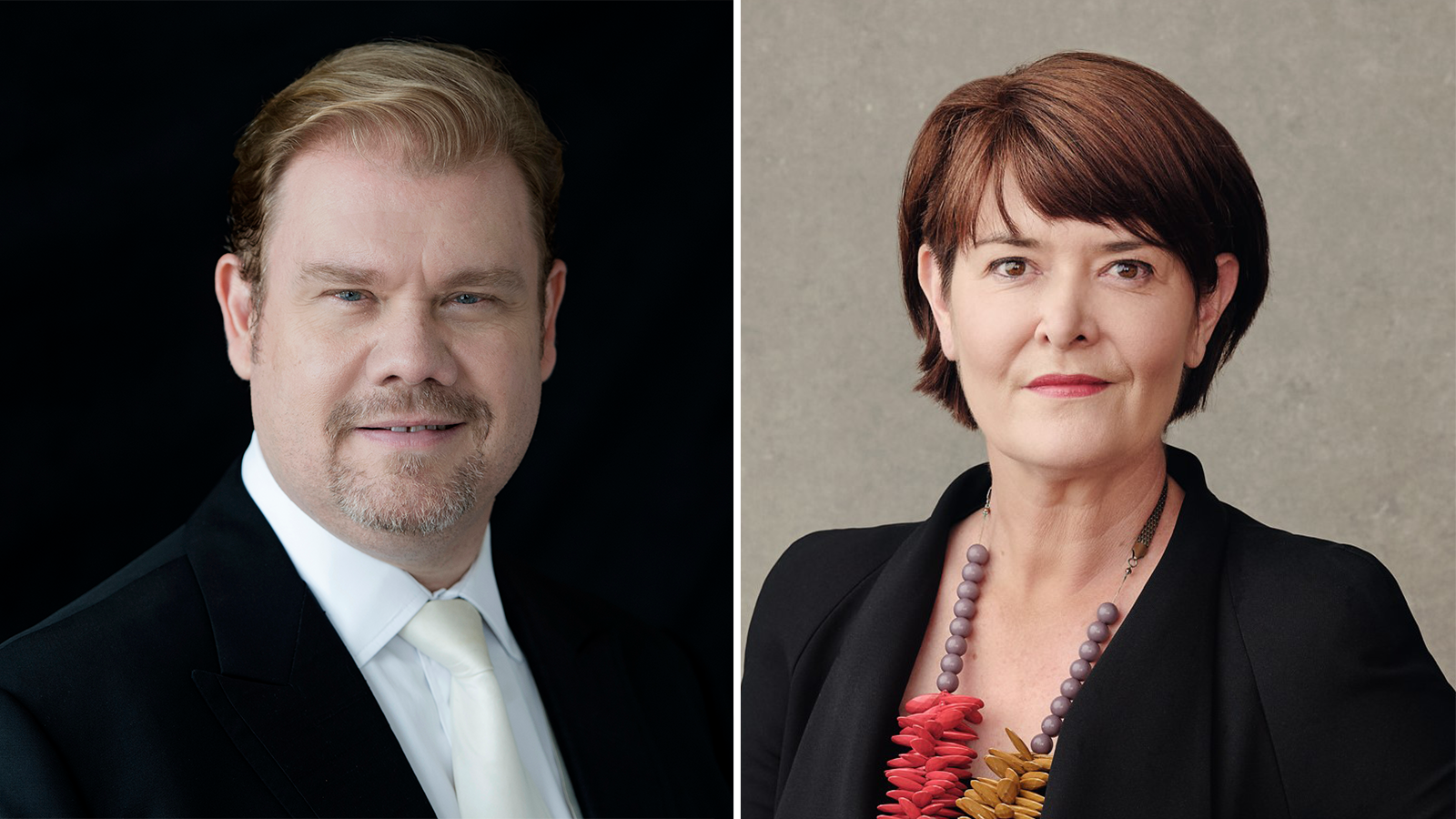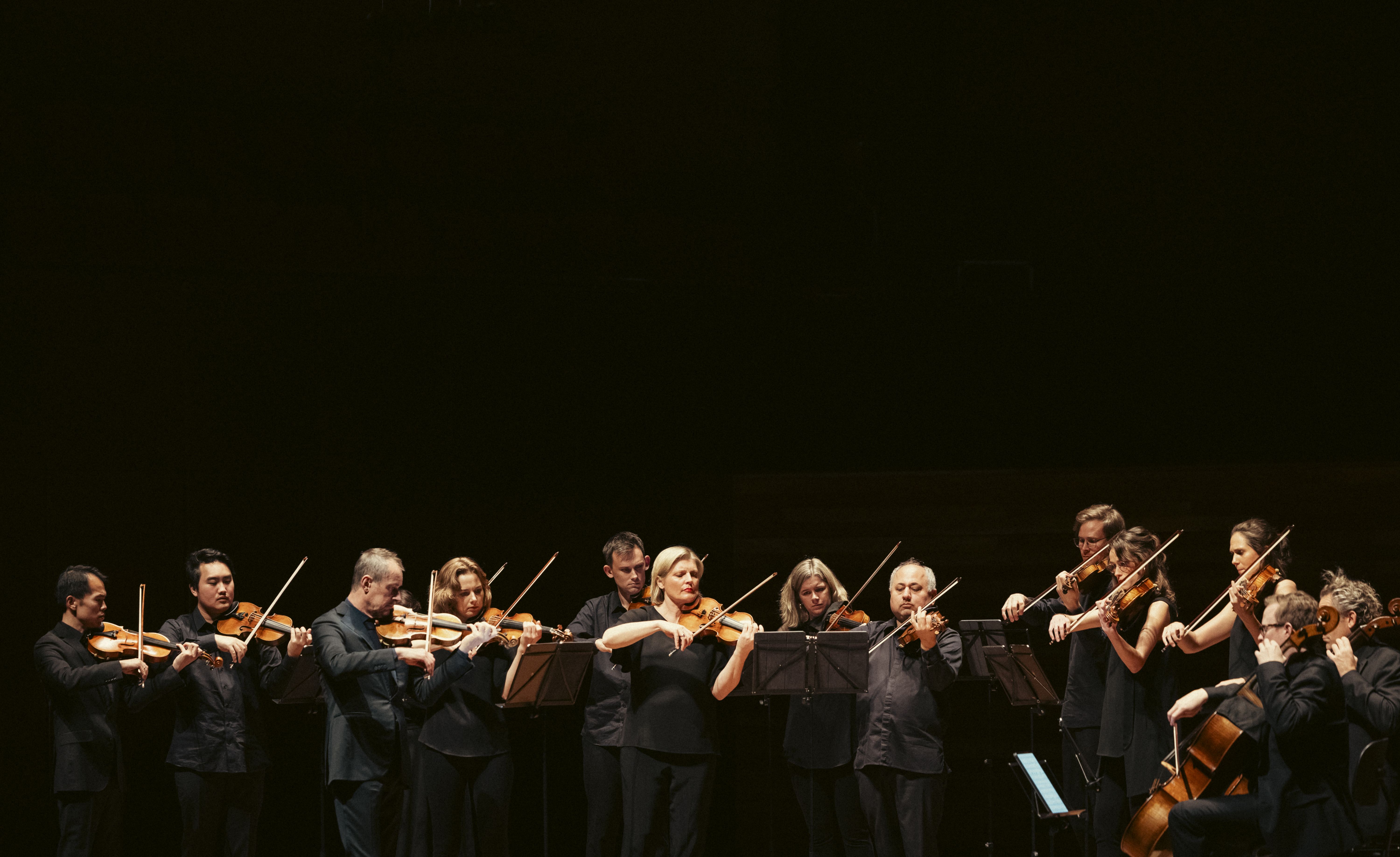
Written by Anna Snoekstra
Catherine Carby and Stuart Skelton have known each other for many years, although they have long been separated by the North Atlantic Ocean. From Brisbane and Sydney respectively, Carby speaks from her kitchen table in London, while Skelton is in his office at the Cincinnati College-Conservatory of Music.
Even after decades of successful careers overseas, both consider Australia their true home. “There’s nowhere quite like it,” Skelton confides. “I've lived in a lot of places. I've seen a lot of the world, but Sydney will always be home.”
Skelton was a choir boy at Saint Andrew’s Cathedral. Although he wasn’t from a creative family, this early connection with music changed the course of his life. “My mother tells this story that I came home when I was seven and said, ‘I want to learn the piano’. No one had an explanation for it. No one in our family had a piano, so my parents went out and bought one and found a piano teacher.” From there, his aptitude for music only grew.
Carby was the only musical member of her immediate family as well. In high school she joined the Queensland Youth Orchestra: “it was my only extracurricular thing because I was so hopeless at sport.” She fell in love with the French horn, and although she was good at it, she realised that she wasn’t going to be “the best”. However, her talent for singing showed huge potential so she followed that path. “Plus,” she adds, thinking back on her decision, “I realised you got to dress up and wear costumes and wigs and all that stuff.”
After she left Australia and completed her studies at the Royal College of Music in London, Carby found that those costumes weren’t quite what she originally expected. As a mezzo-soprano, she has performed most in “trouser roles” as the lead at Royal Opera House, English National Opera and Opera Australia. “If you google it, you'll see any number of pictures of me dressed as a bloke,” she tells me. “Wearing trousers and kissing girls, basically.”
“My mother tells this story that I came home when I was seven and said, ̒I want to learn the piano’. No one had an explanation for it.”
Skelton also began his schooling in Australia but graduated overseas. For him, it was the United States rather than Britain or Europe. The Cincinnati College Conservatory of Music is his alma mater and the office where Skelton is speaking, with its wall of bookshelves and glossy black Steinway piano, used to be his teacher’s. Skelton’s breakthrough performance was as Lohengrin in Karlsruhe, which got him noticed around the world. He has performed with the world’s great opera companies, from the Royal Opera House in London and La Scala in Milan to the Metropolitan Opera in New York.
After decades living and working mostly internationally, Carby and Skelton both tell me how enthusiastic they are for the opportunity to return to their homeland for the ACO’s intensive multi-city tour of Gustav Mahler’s Das Lied von der Erde (Song of the Earth), a song cycle they both adore. The program begins with Richard Wagner’s Siegfried Idyll, an apt inclusion given Wagner’s impact on Mahler.
Skelton is renowned for his interpretations of Wagner. “Richard Wagner cast a shadow over western music that we still haven't escaped,” he says. “The fabric of tonality started to fray with Wagner and through Mahler, and then Berg, Webern and Schoenberg, they just tore the fabric out… I love Mahler, as a performer as well as an audience member, and I think it's a remarkable thing that he took the Wagnerian musical language and turned it into a language of his own.”
Like Skelton’s admiration of Wagner, Carby has great respect for the work of the Austrian composer and writer, Alma Mahler-Werfel. In these concerts with the ACO, Carby will be performing new arrangements by David Matthews of Mahler-Werfel’s Laue Sommernacht, Die stille Stadt and Bei dir ist es traut. “She had a crazy, hilarious, amazing life,” Carby says. “But in her own right she was a fantastic composer.”
“Two of Stuart’s songs are about drunkenness,” Carby says, laughing. “The very first song is about drunkenness, and then the second one he does is about drunkenness in spring.”
Mahler-Werfel is largely remembered by her marriages to three very famous men. After Mahler’s death she wed Walter Gropius, founder of the Bauhaus, and then Franz Werfel, a renowned Austrian poet. She wrote a lot of songs, many of which had been lost either during the war or because Mahler, older and more famous than she was, forbade her from composing in order to preserve their marriage – he believed that there could only be one composer in the household. “So, she put her composing to one side for a long time to be a good housewife, basically, to support the man,” says Carby. “In her lifetime she wrote some exquisite songs with an expanded harmony soundworld set to really beautiful poetry. She should be much more famous as a composer, rather than as the wife of famous men.”
The title card of the program, Das Lied von der Erde, was written by Mahler only two years before his death. He never saw the first public performance on November 1911 in the TonHalle in Munich, six months after he died. The creation of this highly intense symphony cannot be separated from the trials of Mahler’s life at the time.
“He’d hit rock bottom, and then had to rediscover who he was,” Carby says. “Everything that he had known in his life didn't exist anymore. His job was gone, his child was gone, his health was failing and his wife, Alma, was desperately unhappy.” The six songs that comprise the cycle are Drinking Song of Earth’s Misery, The Solitary One in Autumn, Of Youth, Of Beauty, The Drunken Man in Spring and The Farewell. Carby and Skelton alternate throughout, with their performances engaging different stratospheres of emotion.
“If you’re singing from memory, you’re physically naked, essentially. You’ve got no stand, no score, nothing to look at that distracts the audience from honing in on you.”
For Skelton, it provides an opportunity to be totally swept away by the music, “I get to stand there for the second half of that piece and just let it pull me to pieces and not have to worry about the end. I can literally let that last 30 minutes completely destroy me, which it’s designed to do, and not care.”
I ask him if that’s an intense experience, to stand right next to someone as they sing something so emotionally charged. “Oh yes,” he says. “In the best possible way. If you were singing that you couldn't let yourself get carried away. You have to walk that feathers-edge of not falling over into where everyone else is going when you're singing.”
“Channeling that emotion must be difficult,” I say, thinking aloud. “I know when I get emotional my throat feels like it’s closing up, which you can’t let happen in that situation.”
“No, you really can’t,” says Skelton. “Sometimes you can sense it coming and you have to think of something to try and divert that energy a little bit. It's just such a remarkable piece. There are some absolute classic lines, some remarkably profound things. My favorite line in the whole piece is ‘Die müden Menschen gehn heimwärts / Um im Schlaf vergeßnes Glück / Und Jugend neu zu lernen’, which translates to ‘The tired men go home / in sleep to learn anew / of forgotten happiness and youth’. What a line!”
Both Skelton and Carby will be performing without scores, singing the whole cycle from memory. This is no small task, especially for Carby with her half-hour finale. She is using multiple techniques to face this challenge. “When you learn an opera, it’s a lot of everyday speech, like ‘he said’, ‘she said’, and then we did this,” she says. “Whereas this is poetry. It’s all imagery. It is image after image after image that doesn’t really have a simple narrative. So, trying to get it from memory is incredibly difficult. I’ve made these great, elaborate mind maps and got my pencils out and coloured things in.”
I ask her if singing from memory changes the experience of the performance and she nods. “If you’re singing from memory, you're physically naked, essentially. You’ve got no stand, no score, nothing to look at that distracts the audience from honing in on you. Sometimes with a score you can be a bit of an observer to the music, rather than inside the music.”
The tour itself will also be intense, covering four states and six venues over 12 days, although this is the type of performance they would more usually perform as a one-off concert. “It takes a huge number of resources,” Carby says. “You’ve got to have orchestral players. You’ve got to have a tam-tam player, a celeste, a mandolin. And, you know, two soloists who can cope with the demands of it. It’s really unusual to do a long series of it, it will be fascinating to see how it develops or changes.”
Both performers are already planning how they will keep their momentum and protect their voices during this period. It requires a lot of discipline. They both mention methods such as intense warm-ups and warm-downs, steaming and always wearing masks in public. They also both plan to avoid speaking as much as possible during those 12 days.
“Once you’re done, you just have to go back to the hotel room or wherever you’re staying, and just shut up till tomorrow,” Skelton says. “Sometimes you have to do that, it’s part of the discipline for your audience.”
“I’ve never done a tour of this piece with so many performances packed into such a close period of time. So ask me again at the end of May, but I can tell you what it’s like when you’re doing a run of performances of say, Tristan or Peter Grimes or something like that. They’re also incredibly musically intense, and physically intense and I imagine this will be similar. At the end of the run you feel happily spent. You’ve emptied yourself of all the things that you can give to your audience.”
Stuart Skelton and Catherine Carby star in Mahler's Song of the Earth, directed by Richard Tognetti, and touring to Sydney, Melbourne, Brisbane and Canberra. Click here for tickets.
Anna Snoekstra is the author of five novels that have been translated across the globe, most recently Out of Breath. Her next novel, The Ones We Love, is out May 2025 with UItimo and PRH.
